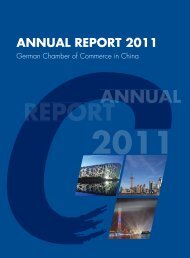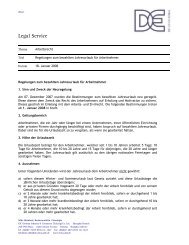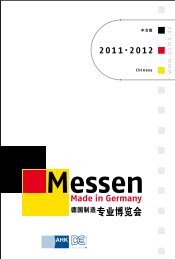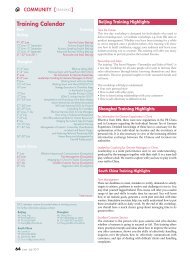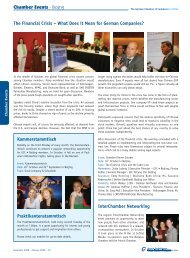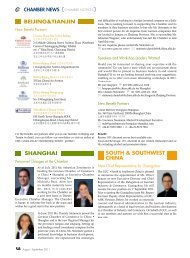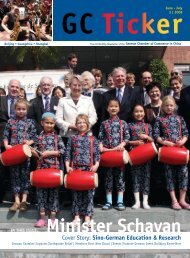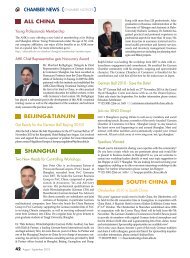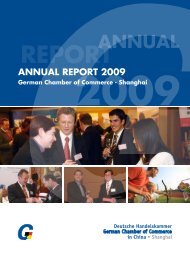Minister Steinmeier - AHKs
Minister Steinmeier - AHKs
Minister Steinmeier - AHKs
You also want an ePaper? Increase the reach of your titles
YUMPU automatically turns print PDFs into web optimized ePapers that Google loves.
The German Chamber of Commerce in China<br />
Difficult<br />
It can<br />
be done<br />
Easy<br />
Company<br />
Address<br />
Brand<br />
Recognition<br />
Industy<br />
Overview<br />
Investment<br />
Plans<br />
Acquisition<br />
Suitability<br />
Basic<br />
Financials<br />
Supplier<br />
List<br />
Shareholders<br />
Government<br />
Regulations<br />
Cost and<br />
Pricing<br />
Structure<br />
Corporate<br />
Reputation<br />
Media<br />
Monitoring<br />
tainly no disappointment in that respect. Firstly, there’s communication.<br />
The Chinese language is often vague and somewhat poetic where<br />
English would be specific and succinct. Often in our office in Shanghai,<br />
when a vague approach is required and language is optional, we’ll<br />
choose Chinese over English, as it allows for more flexibility.<br />
Another challenge is the approach to information collection and dissemination.<br />
Protecting information is an important characteristic<br />
of the local culture, along with a reluctance to be held responsible<br />
for losing it. If a research respondent perceives any risk associated<br />
with releasing information or providing feedback, they will often<br />
choose to simply provide no response at all. There is little incentive<br />
for the average purchasing manager or even government employee<br />
to provide information to an external party. In response to the specific<br />
risks associated with passing on information, and since the field<br />
of market research is also relatively new in China, researchers must<br />
assure respondents of the standard practices and procedures that are<br />
designed to protect them and the information they disclose.<br />
Having said that, China presents a dynamic, fast-paced business environment,<br />
that embraces an adaptable ‘can-do’ business ethic. In a<br />
country often considered to be mysterious and unpredictable, we find<br />
many of the respondents we speak to are open and keen to share<br />
knowledge. As the fields of business intelligence and industry research<br />
are new to most respondents here, many of the interviews and discussions<br />
we hold on behalf of our clients provide refreshing and innovative<br />
feedback.<br />
Another key aspect which is often overlooked is the country’s sheer<br />
enormity. In a market the size of China, geographic differences are<br />
wide and industries are often fragmented. Extracting comment on the<br />
nature of one industry across the entire country is unrealistic. It is<br />
often advisable to collate regional research from across the country to<br />
build the national picture. China’s administration according to province,<br />
municipality, district, town and village means a senior manager<br />
in the province of Zhejiang may well assume that a researcher is only<br />
considering Zhejiang province when posing questions about issues<br />
such as the development of an industry over the coming 5 years. The<br />
challenge for the researcher is that if they emphasize that a national<br />
perspective is being sought, it’s possible that the respondent will feel<br />
ashamed of their lack of broader knowledge and become uncooperative.<br />
For this reason, researchers in China need to carefully ascertain<br />
Competitor<br />
Market<br />
Market<br />
Forecasting<br />
Market<br />
Segmentation<br />
Sino - German Business<br />
whether a subject is commenting on the local<br />
picture and precisely how local it is.<br />
These geographic differences extend to local<br />
business practices and customs. With companies<br />
based in Beijing, for example, it’s often<br />
a good idea to send a fax to lay down the<br />
groundwork for a phone conversation. On the<br />
other hand, in Shanghai, business is conducted<br />
predominantly over the phone. In Beijing, it<br />
can be necessary to conduct a face-to-face<br />
meeting at the outset before further meetings<br />
are agreed to. This extends the timeline on<br />
projects, and based on experience, it’s difficult<br />
for clients outside China to understand the significance<br />
of this initial face-to-face meeting.<br />
The value of recognizing a custom such as this<br />
is enormous, as there is often a transformation<br />
in attitude on the local side.<br />
Patience is a virtue – admit early on in the business intelligence<br />
process that you are never going to have enough data, and work to<br />
piece together parts of the puzzle over time.<br />
Laura Mitchelson is Strategic Director of Amber, a Shanghaibased<br />
consultancy specialized in market and competitive intelligence<br />
and business analysis in China. Contact: lmitchelson@<br />
amberinsights.com.<br />
www.china.ahk.de 15 | August - September 2008<br />
Customer<br />
List<br />
Organization<br />
Chart<br />
Business Focus




